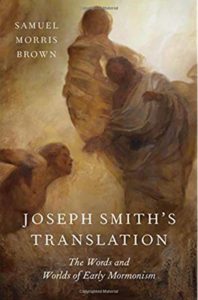 Review
Review
Title: Joseph Smith’s Translation, The Words and Worlds of Early Mormonism
Author: Samuel M Brown
Publisher: Oxford University Press
Genre: History/Philosophy/Religion
Year Published: 2020
Number of Pages: 299
Binding: Cloth; Digital
ISBN10: Cloth, 0190054239; Digital, 0190054239
ISBN13: Cloth, 978-0190054236; Digital, 978-0190054236
Price: Cloth, 34.95; Digital, 34.95 (list)
Reviewed by Josiah Lawrence for the Association for Mormon Letters
Samuel M. Brown’s new book Joseph Smith’s Translation, The Words and Worlds of Early Mormonism observes the founding prophet’s ideas and environment without animosity or adoration. Every biographer of a figure who is no longer living must pass their subject through the lens of psychological estimation. In that sense, Brown leans away from Freud and into Jung. This is not merely a discussion of the prophet’s methods and works of translation, but an exploration of the ontological concepts that both gave rise to and shaped his ideas and actions. This book is an evolutionary glance at the common ancestor of modern Mormon thought and the habitat that shaped it.
Because our language remains inadequate to describe a complex system acting beyond individual consciousness, readers of evolutionary ideas must adjust their lexicon of familiar words to include unfamiliar mechanisms of action. In order to see the picture clearly, you must lose focus on the mindset of your own age and environment. The author was considerate enough to explicate his notes beyond academic formality. There are asides that will help the reader reorient to the ideological landscape Smith foraged in. Brown is clearly familiar with the important scholarly literature of Mormon History, but his book could be approached as a first read on the subject as long as you were armed with some amount of higher education. That being said, it reads fast for scholarly work. Once one gets a feel for the complexity of the subject it becomes apparent how remarkably succinct the author is.
In some ways, the author’s arguments are supported by a prior understanding of Dan Vogel’s family dynamics hypothesis. The young Smith postulated by Vogel is distraught by the tensions between his parents’ incompatible memetics. He is torn between his father’s Universalism and his mother’s Calvinism. Brown describes a man, years later, who seems to possess an endless well of paradoxical explanations for beliefs that were long thought mutually exclusive. Brown argues that Smith is both esoteric and exoteric. This is at the heart of what translation is in Brown’s estimation of Smith. His prophetic work is to explicate the supernatural realm in terms of natural law. This gathers individual will into a community that empowers salvation. Smith translated the classical chain of being into a kind of divine genetic connection that spanned the heavens and earth. Salvation became a familial affair.
When Mormonism’s maladaptation’s to our modern age clash with mainstream ideology in the news they can seem like a caricature. Without making truth claims Samuel Brown helps us understand Joseph Smith’s ideas as solutions to virtues that humanity lost as it lurched into the modern era. Throughout the book, the author builds a case that Smith was resistant to the individualism inherent in the emerging collective ethos. However, Brown supports this inference by referring to several places in writing where Smith expresses a dislike of loneliness. This is a universal human sentiment and Smith’s seemingly frequent expression of it does not, by itself point to a philosophical bent away from individualism on his part. A part of me wishes the author had developed this argument more explicitly. That being said, his book will give an ardent skeptic newfound appreciation for what Joseph Smith was. This analysis of his environment, how it operated, and how he was an outgrowth of it is the ultimate antidote for presentism. The inner analysis of the individual, by itself, is inadequate.
